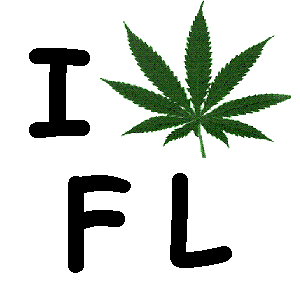 Florida Marijuana Policy
Florida Marijuana Policy
Florida is not exactly the most marijuana friendly state in the US. In fact, the marijuana laws in Florida are pretty harsh! For instance, if you get caught near a ‘specified area,’ and the cops think that you are ‘intending to distribute’ marijuana, you are looking at 15 years in the slammer! Florida is not the worst in the nation, but they are FAR from the best when it comes to marijuana laws and policies. However, if you take an objective look back at history, it is not hard to determine why the ‘reefer madness’ attitude is so prevalent in Florida. For a long, long time, it was the main point of entry for smuggled marijuana, in addition to other truly harmful narcotics. When that happens, neo cons will react with really, really harsh laws, and since they are not the most intelligent crowd, they wrongfully lump marijuana in with the rest of the substances. The same can be said about states that border Mexico.
Medical marijuana has been gaining ground in Florida, at least amongst the citizens. Florida politicians on the other hand, in classic fashion, are dragging their feet on the issue. The Florida media is apparently on the side of the politicians, as a recent headline read, “While some states consider medical marijuana, Florida doesn’t.” The article cited Florida Sen. Don Gaetz, R-Niceville, Chair of the Senate Health Regulation Committee, saying that ‘since he has chaired the committee, no member of the Florida Senate has contacted him and asked that a medical marijuana bill be placed on the agenda. Gaetz also said he wasn’t aware of any request from the state’s medical community or patient caregivers or providers to consider a change in the law.’ Let’s see if we can prove Mr. Gaetz wrong…it’s not hard…
While I was researching organizations for TWB’s Florida marijuana activism page, I came across quite a few people that wanted to ‘consider a change in the law.’ People United for Medical Marijuana — Florida seems to be very active in the State, as does NORML, Americans for Safe Access, Drug Policy Forum Florida, Marijuana Policy Project, and Florida Cannabis Action Network. All of these organizations include members from the medical community, so how Senator Gaetz can make the claim that he wasn’t aware of any of them, is beyond me…Other than if he DOESN’T DO HIS JOB AND ONLY LOOKS OUT OR SPECIAL INTERESTS…I’ll let you decide. I’m from Oregon, and I know about them, so they are not too hard to find!
The members of these hardworking pro-medical marijuana organizations are in the process of gathering signatures to bring medical marijuana to the ballot box. Since state politicians won’t give the citizens what they want, it is up the citizens to get it for themselves. In the meantime, I have come across some very interesting court cases from Florida that might be of some assistance, should someone be on trial for medical marijuana in that State. These do not apply to other states, because of the jurisdiction and laws that are involved, but even then, they are still VERY interesting.
In State of Florida v. Musikka (1989), a woman who was charged with cultivation of six marijuana plants used the ‘medical necessity defense’ and won. The woman suffered from severe glaucoma, had already lost vision in one eye after a failed procedure, and used marijuana to prevent blindness in her other eye. A physician from Bascom-Palmer Eye Institute (the woman’s doctor) even testified at trial that he knew about the marijuana use and that he encouraged it. By the end of the trial, Judge Mark E. Pollin found the woman not guilty. In his written opinion, Judge Pollin reasoned:
“In our haste to rightfully prosecute those who profit from the social trafficking and sale of illicit drugs we cannot become blind to the legitimate medical needs of those who are afflicted by incurable diseases and require appropriate medical care. To ignore the plight of such people renders the law callous to the most basic of all human rights; the right of self-preservation…
This is an intolerable, untenable legal situation. Unless legislators and regulators heed these urgent human needs and rapidly move to correct the anomaly arising from the absolute prohibition of marijuana which forces law abiding citizens into the streets – and criminality – to meet their legitimate medical needs, cases of this type will become increasingly common in coming years. There is a pressing need for a more compassionate, humane law which clearly discriminates between the criminal conduct of those who socially abuse chemicals and the legitimate medical needs of seriously ill patients whose welfare and very lives may depend on the prudent therapeutic use of those very same chemical substances.”
In Jenks v. State of Florida (1991), the First District Court of Appeals reversed the conviction of a married couple charged with cultivating of marijuana. In that case, the Court established the medical necessity defense as follows:
1.The defendants had no control over the circumstances which required the choice between the lesser of two evils;
2.No less harmful alternative was available; and
3.The harm sought to be avoided was less offensive than the criminal acts committed to avoid it.
The Jenks Court concluded that marijuana’s classification as a Schedule 1 controlled substance did not trump the medical necessity defense. Specifically, the Jenks Court noted that the statute provided that “[n]otwithstanding the aforementioned fact that Schedule I substances have no currently accepted medical use, the Legislature recognizes that certain substances are currently accepted for certain limited medical uses in treatment in the United States but have high potential for abuse.”
When the Florida Legislature tried to change the language of the bill in order to get around the court system, the First District Court of Appeals ruled in Sowell v State (1998) that the medical necessity defense was still valid, regardless of the slimy maneuvers at the Florida capital. The Sowell Court reasoned:
“The ‘limited medical uses’ language which was formerly contained in section 893.03(1)(d) did not directly address the medical use of marijuana or the defense of medical necessity, and under established rules regarding the preservation of the common law the chapter 93-92 amendment to section 893.03(1)(d) does not affect the defense of medical necessity. Indeed, the existence of this provision was not critical to the decision in Jenks, which was more fundamentally predicated on the understanding that the ‘no currently accepted medical use’ language in the subsection (1) introduction relates to general medical availability, and does not preclude the common law defense. As in Jenks, the appellant should have been allowed to pursue the defense of medical necessity.”
Long story short, the Florida legislature can try all they want, but the medical necessity defense is still valid at this point. Before you try to go set up a large scale garden thinking that the medical necessity defense will protect you, remember this; it does not protect you from police harassment and seizing of your property, it only protects you when you are before the judge…proceed with caution. If citizens of Florida really want to make things better for themselves, and bring real change for medical and recreational users in the State, the best thing to do is GET ACTIVE! You can visit our Florida activism page, and feel free to shoot me an e-mail if you know of, or are part of, an organization that is fighting for marijuana reform.


























